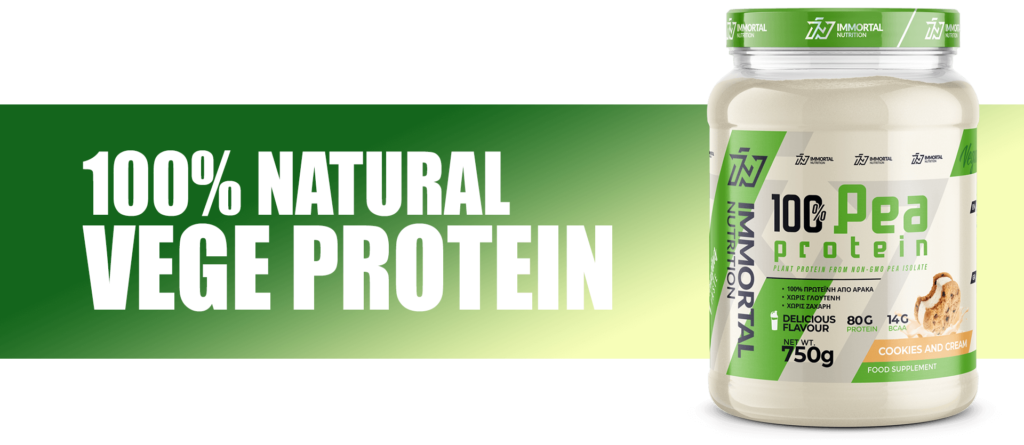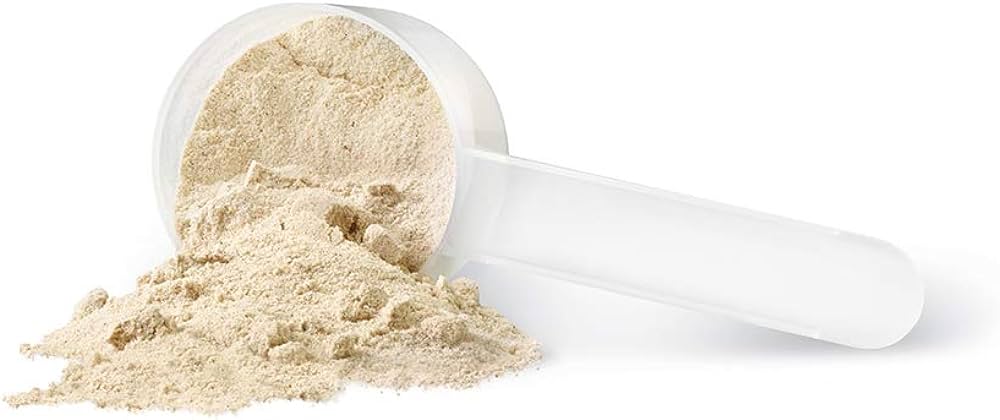
WHAT IS PEA PROTEIN?
Pea protein is a high-quality protein extracted from peas, specifically the yellow split pea. It’s a popular choice in the world of dietary supplements, particularly for those seeking plant-based protein alternatives.
It’s commonly found in powdered form and can be added to a variety of foods and beverages like smoothies, shakes, and even baked goods.

HOW DOES PEA PROTEIN WORK?
Here are some key aspects of pea protein:
- Plant-Based Source: Pea protein is an excellent option for vegetarians, vegans, and those with allergies or sensitivities to dairy or soy-based proteins.
- Rich in Essential Amino Acids: Pea protein contains a favorable amino acid profile, including branched-chain amino acids (BCAAs) which are crucial for muscle growth, repair, and overall body function.
- Highly Digestible: It is easily digestible and generally well-tolerated, making it a good choice for those with sensitive stomachs or digestive issues.
- Hypoallergenic: Pea protein is naturally hypoallergenic, meaning it’s unlikely to cause allergic reactions, which makes it a safe option for many people.
- Nutrient-Rich: Beyond protein, pea protein often contains other beneficial nutrients, including iron and beneficial fibers.
- Environmental Sustainability: As a plant-based protein, pea protein is more sustainable and environmentally friendly compared to many animal-based protein sources.
Due to these qualities, pea protein has gained popularity in the health and wellness community as a versatile and beneficial protein supplement.
The benefits of pea protein and other plant-based proteins can be advantageous for a wide range of individuals:
- Vegetarians and Vegans: People following a vegetarian or vegan diet often use plant-based proteins, like pea protein, to meet their protein requirements without consuming animal products.
- Individuals with Allergies or Intolerances: Those who are lactose intolerant, allergic to dairy, or have sensitivities to other common protein sources like soy or gluten, can benefit from pea protein as a hypoallergenic alternative.
- Athletes and Fitness Enthusiasts: Plant-based proteins provide essential amino acids necessary for muscle repair and growth, making them suitable for athletes and those engaged in regular physical activity who want to increase their protein intake.
- Environmentally Conscious Consumers: Individuals who are environmentally conscious may prefer plant-based proteins due to their lower ecological footprint compared to animal-based proteins.
- People Seeking Weight Management: Plant-based proteins can be beneficial for those looking to manage or lose weight. Protein-rich diets have been shown to enhance satiety and reduce overall calorie intake.
- Health-Conscious Individuals: Those looking to improve their overall health and ensure a balanced diet might incorporate plant-based proteins as a part of a diversified, nutrient-rich diet.
- Individuals Looking for Digestive Health Benefits: Plant-based proteins are often easier to digest and can be gentler on the gut, making them a good choice for individuals with digestive concerns.
Pea protein and other plant-based proteins are versatile and can be beneficial for anyone looking to enhance their diet with a high-quality, sustainable protein source.
Whey protein and pea protein are both popular dietary supplements, but they differ in their source, digestibility, and nutritional profile. Whey protein, derived from milk, is a complete protein containing all essential amino acids and is known for its rapid absorption, making it a favorite among athletes for post-workout recovery. It’s rich in branched-chain amino acids (BCAAs), particularly leucine, which is crucial for muscle synthesis. On the other hand, pea protein, sourced from yellow split peas, is a plant-based alternative that’s hypoallergenic and a great option for those with dairy intolerances or following a vegan diet. While slightly lower in some amino acids compared to whey, pea protein is still a good source of BCAAs and is particularly high in arginine, beneficial for blood flow and heart health. It’s also environmentally friendly, having a lower ecological footprint than animal-based proteins. Both proteins offer unique benefits, making them suitable for different dietary needs and preferences.
PRODUCT FACTS

100% Pea Protein is a versatile supplement that can be incorporated into various meals and recipes beyond just shakes. Here are some creative ways to use it:
- Smoothies and Smoothie Bowls: Blend pea protein into fruit or vegetable smoothies for a nutrient boost. It can also be used as a topping for smoothie bowls, mixed with fruits, nuts, and seeds.
- Baking: You can use pea protein in baked goods like muffins, pancakes, bread, or cookies. It adds a protein boost while often enhancing the texture of the baked product.
- Breakfast Bowls: Stir pea protein into oatmeal or yogurt for a satisfying and protein-rich breakfast. It can be combined with fruits, nuts, and a sweetener of choice.
- Energy Bars and Bites: Homemade energy bars or protein balls are excellent snacks where pea protein can be a key ingredient. Mix it with ingredients like oats, nuts, honey, and dried fruits.
- Soups and Stews: For a protein boost, pea protein can be stirred into soups and stews. It thickens the broth slightly and adds nutritional value without altering the flavor significantly.
- Protein-Packed Pasta: Mix pea protein into your homemade pasta dough for a protein-enriched meal.
- Vegetarian or Vegan Meat Alternatives: Use pea protein as a base for vegetarian burgers, meatballs, or other meat substitutes.
- Sauces and Dressings: Add a scoop of pea protein to sauces or dressings for salads to increase their protein content without compromising the taste.
- Dairy-Free Creamer Alternative: For a dairy-free creamer alternative, mix pea protein with a little water and add it to your coffee or tea.
NUTRITION VALUE
in 30 g (one portion) | in 100 g |
|
| Energy value | 490 kJ / 117 kcal | 1635 kJ / 391 kcal |
| Fats | 1,89 g | 6,3 g |
| - including saturated fatty acids | 0,45 g | 1,51 g |
| Carbohydrates | 1,05 g | 3,5 g |
| - including sugars | 0 g | 0 g |
| Proteins | 24 g | 80 g |
| Salt | 0,18 g | 0,6 g |
INGREDIENTS
AVAILABLE FLAVORS
HOW TO USE PEA PROTEIN?
30 g portion (1 scoop) of the product mixed with 200 ml of water, use once a day. Consume immediately after preparation.
EAN LIST
5060575581514 (banana), 5060575581521 (cappucino), 5060575581538 (chocolate), 5060575581545 (chocolate banana), 5060575581552 (chocolate hazelnut), 5060575581569 (cookies & cream), 5060575581576 (fudgy brownie), 5060575581583 (salted caramel), 5060575581590 (vanilla).
STORAGE CONDITIONS
Store in a cool, dry place at room temperature, in a tightly closed container, away from light and moisture, and out of reach of small children.
ALLERGEN INFORMATIONS
Possible unintentional quantities of gluten, eggs, sesame seeds, nuts, celery, soy and crustaceans.
WARNINGS
Do not exceed the recommended daily dose. This food supplement should not be used as a substitute for a varied diet. The product is not intended for use by children, pregnant, or breastfeeding women. Do not use in case of hypersensitivity to any of the ingredients. A balanced diet and a healthy lifestyle are important.


